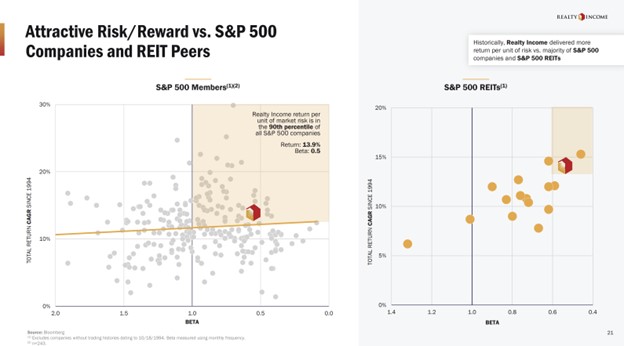Real estate investment trusts (REITs) can be fantastic investments. They supply investors with passive income. Further, REITs have historically outperformed the S&P 500 over the longer term.
On top of all that, our research has found that many REITs deliver those higher returns with less volatility compared to the broader market. Three REITs have stood out for their ability to produce high returns with lower volatility: Realty Income(NYSE: O), Essex Property Trust(NYSE: ESS), and Public Storage(NYSE: PSA). Here's a look at these reliable REITs.
A reliable grower
Realty Income stands out among REITs. The diversified REIT has delivered a 13.9% compound annual total return since its public market listing in 1994. While that's not the highest return over that period, it has delivered one of the best returns per unit of risk as measured by beta:

Image source: Realty Income.
As that slide shows, Realty Income is in the 90th percentile among S&P 500 members for the return it delivers per unit of risk. A big driver is its low beta, the second lowest among REITs in the S&P 500.
Several factors drive Realty Income's low volatility. A big one is the overall stability of its cash flow. The company owns commercial properties secured by long-term net leases with high-quality tenants in industries relatively immune to economic downturns and the disruption of e-commerce (e.g., grocery stores, home improvement centers, and warehouses). The net lease structure requires the tenant to cover maintenance, building insurance, and real estate taxes. This business model enables it to generate very stable cash flow, three-quarters of which it pays investors via its monthly dividend.
Realty Income also has one of the highest credit ratings in the REIT sector. The company's combination of a durable portfolio and strong financial profile allows it to steadily grow its portfolio, cash flow, and dividend (106 consecutive quarterly increases). That drives reliable returns for its investors.
A West Coast focus has driven peer-leading returns
Essex Property Trust has also delivered strong returns for less risk. The apartment REIT has delivered a 13.7% compound annual growth rate in its total return since its initial public offering in 1994. That's the highest return among multifamily focused REITs. The company has delivered those returns with less volatility than the broader market (0.8 average beta over the last five years).
A few factors have helped drive its reliable returns. A big one is its focus on housing-constrained markets along the West Coast. That has helped drive above-average net operating income growth compared to other REITs due to high occupancy levels and higher average rent growth. The company also has done an excellent job of investing capital to expand its portfolio via high-return acquisitions and development projects. These catalysts have helped drive above-average cash flow per share growth, enabling Essex Property Trust to deliver peer-leading dividend growth (487% over the last three decades).
Essex Property Trust backs its strong portfolio with a rock-solid balance sheet. Its strong credit rating gives it the financial flexibility to make value-enhancing investments.
The low-volatility leader
Public Storage has the lowest volatility among REITs in the S&P 500 (around 0.5 times over the past five years). The self-storage REIT has also delivered an impressive 12.4% average annual return since going public several decades ago.
Its focus on self-storage properties is a big factor driving its reliable, low-volatility returns. They have a low break-even point (40% to 45% occupancy compared to 60% or more for multifamily properties), enabling the company to consistently generate strong earnings. Meanwhile, demand for self-storage properties tends to be relatively recession-resistant. On top of that, demand for space in those facilities has been steadily rising as more people use them to store their stuff. These catalysts have helped drive strong occupancy and rental growth rates for self-storage operators over the years. Since 2004, its same-store net operating income has grown at a 5.1% compound annual rate, much faster than the core real estate sector average of 2.9%.
Another factor driving Public Storage's low volatility is its fortress-like balance sheet. It has one of the highest credit ratings in the REIT sector. That gives it the flexibility to invest in high-return development projects and make accretive acquisitions.
Reliable returning REITs
Realty Income, Essex Property Trust, and Public Storage have been fantastic long-term investments. The REITs have delivered strong returns with a lot less volatility than the broader market. Given the durability of their business models and their strong financial profiles, these top REITs should be able to continue delivering reliable returns for their investors in the decades ahead.
Should you invest $1,000 in Realty Income right now?
Before you buy stock in Realty Income, consider this:
The Motley Fool Stock Advisor analyst team just identified what they believe are the 10 best stocks for investors to buy now… and Realty Income wasn’t one of them. The 10 stocks that made the cut could produce monster returns in the coming years.
Stock Advisor provides investors with an easy-to-follow blueprint for success, including guidance on building a portfolio, regular updates from analysts, and two new stock picks each month. The Stock Advisor service has more than tripled the return of S&P 500 since 2002*.
*Stock Advisor returns as of March 25, 2024
Matt DiLallo has positions in Public Storage and Realty Income. The Motley Fool has positions in and recommends Realty Income. The Motley Fool has a disclosure policy.
